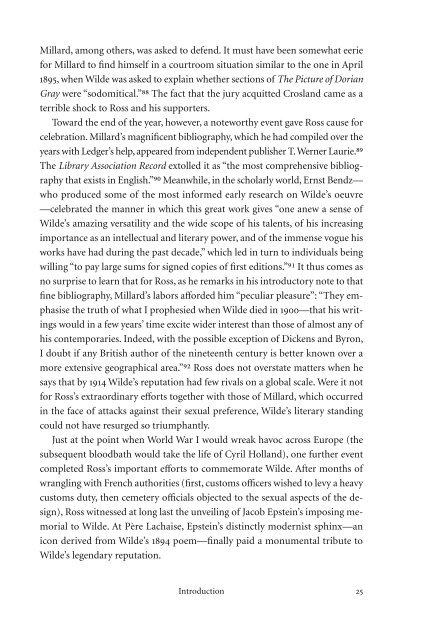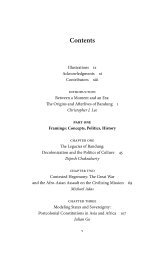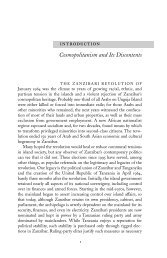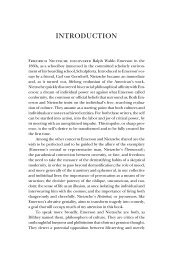Oscar Wilde and Modern Culture - Ohio University Press & Swallow ...
Oscar Wilde and Modern Culture - Ohio University Press & Swallow ...
Oscar Wilde and Modern Culture - Ohio University Press & Swallow ...
Create successful ePaper yourself
Turn your PDF publications into a flip-book with our unique Google optimized e-Paper software.
Millard, among others, was asked to defend. It must have been somewhat eerie<br />
for Millard to find himself in a courtroom situation similar to the one in April<br />
1895, when <strong>Wilde</strong> was asked to explain whether sections of The Picture of Dorian<br />
Gray were “sodomitical.”⁸⁸ The fact that the jury acquitted Crosl<strong>and</strong> came as a<br />
terrible shock to Ross <strong>and</strong> his supporters.<br />
Toward the end of the year, however, a noteworthy event gave Ross cause for<br />
celebration. Millard’s magnificent bibliography, which he had compiled over the<br />
years with Ledger’s help, appeared from independent publisher T. Werner Laurie.⁸⁹<br />
The Library Association Record extolled it as “the most comprehensive bibliography<br />
that exists in English.”⁹⁰ Meanwhile, in the scholarly world, Ernst Bendz—<br />
who produced some of the most informed early research on <strong>Wilde</strong>’s oeuvre<br />
—celebrated the manner in which this great work gives “one anew a sense of<br />
<strong>Wilde</strong>’s amazing versatility <strong>and</strong> the wide scope of his talents, of his increasing<br />
importance as an intellectual <strong>and</strong> literary power, <strong>and</strong> of the immense vogue his<br />
works have had during the past decade,” which led in turn to individuals being<br />
willing “to pay large sums for signed copies of first editions.”⁹₁ It thus comes as<br />
no surprise to learn that for Ross, as he remarks in his introductory note to that<br />
fine bibliography, Millard’s labors afforded him “peculiar pleasure”: “They emphasise<br />
the truth of what I prophesied when <strong>Wilde</strong> died in 1900—that his writings<br />
would in a few years’ time excite wider interest than those of almost any of<br />
his contemporaries. Indeed, with the possible exception of Dickens <strong>and</strong> Byron,<br />
I doubt if any British author of the nineteenth century is better known over a<br />
more extensive geographical area.”⁹² Ross does not overstate matters when he<br />
says that by 1914 <strong>Wilde</strong>’s reputation had few rivals on a global scale. Were it not<br />
for Ross’s extraordinary efforts together with those of Millard, which occurred<br />
in the face of attacks against their sexual preference, <strong>Wilde</strong>’s literary st<strong>and</strong>ing<br />
could not have resurged so triumphantly.<br />
Just at the point when World War I would wreak havoc across Europe (the<br />
subsequent bloodbath would take the life of Cyril Holl<strong>and</strong>), one further event<br />
completed Ross’s important efforts to commemorate <strong>Wilde</strong>. After months of<br />
wrangling with French authorities (first, customs officers wished to levy a heavy<br />
customs duty, then cemetery officials objected to the sexual aspects of the design),<br />
Ross witnessed at long last the unveiling of Jacob Epstein’s imposing memorial<br />
to <strong>Wilde</strong>. At Père Lachaise, Epstein’s distinctly modernist sphinx—an<br />
icon derived from <strong>Wilde</strong>’s 1894 poem—finally paid a monumental tribute to<br />
<strong>Wilde</strong>’s legendary reputation.<br />
Introduction 25
















